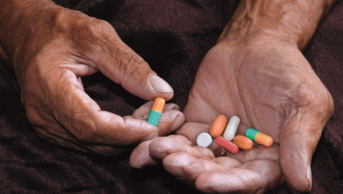
Royal Pharmaceutical Society
The government has announced that an additional £3.5bn will be released for primary and community care by 2023/2024 in an effort to reduce hospital admissions.
In a statement, the government said that part of the the funding will pay for “the national roll out of a successful pilot”, which assigned pharmacists to care homes.
Speaking to The Pharmaceutical Journal, the Department of Health and Social Care (DHSC) clarified that the pilot is set to be rolled out more widely is the “enhanced health in care homes” model — one of five new models of care that were first launched in October 2014.
The care model was initially set up to provide patients in care homes with access to multidisciplinary teams and was piloted across six sites, including Wakefield, Newcastle and Gateshead, East and North Hertfordshire, Nottingham City, Sutton and West Yorkshire.
According to an NHS England framework for the model, pharmacists involved in the scheme were expected to participate in weekly rounds “for reviewing and planning a resident’s care”, alongside “the resident’s GP, the care home team and other members of the local multidisciplinary teams, such as nurse specialists”.
In a statement on the new funding, prime minister Theresa May announced “the national roll out of a successful pilot that sees healthcare professionals assigned to care homes where they get to know individual residents’ needs and can provide tailored treatment and support”.
She added: “The teams include pharmacists and GPs who can also offer emergency care out of hours.”
An assessment of the care model by the King’s Fund found that it is “realistically achievable in any area of England,” adding that “significant results can be visible within a few months” as a result.
NHS England is already recruiting more pharmacy professionals to work with care homes as part of its medicines optimisation in care homes initiative with money from the Pharmacy Integration Fund.
The latest round of funding, which the government clarified is entirely new money taken from the £20.5bn pot announced in June 2018, will also pay for “rapid response teams” made up of “doctors, nurses and physiotherapists and will provide urgent care and support in the community as an alternative to hospital”.
The government suggested that the new funding will not only improve patients’ health but also “reduce costs for the NHS, ease pressure on staff, free up much-needed beds and help cut waiting times by allowing hospitals to focus their resources where they are needed most”.
Ravi Sharma, director for England at the Royal Pharmaceutical Society (RPS), said: “Any investment in patient care is fantastic news. We welcome the DHSC’s recognition of the vital role pharmacists play in supporting care closer to home as part of the multidisciplinary team.
“The focus on the prevention of ill health is a hugely positive step and is central to the role pharmacists play in healthcare.”
He added that the RPS “has long campaigned for the greater integration of pharmacists into the patient pathway”, noting that the Society’s campaign to improve the care of care home residents “has estimated that pharmacists working in care homes across the UK could save the NHS £135m through medicine reviews and preventing emergency hospital admissions”.
Health and social care secretary Matt Hancock said: “To make the NHS sustainable for the long term, we need more prevention as well as cure.
“So we will back our GPs, primary and community healthcare to help keep people healthy and out of hospital in the first place.”


